Nigeria
Nigeria’s president Muhammadu Buhari called on Nigerians to ‘shut out disruptive and corrosive forces’ hiding in the world of social media, in order to safeguard democratic progress made by the country.
Buhari, who was addressing the nation on the occasion of the 58th independence anniversary said technology should be used for knowledge and understanding.
October 1, which is a public holiday in Nigeria and commemorates the day in 1960 when Nigeria won independence from Britain, traditionally sees presidents take stock.
Below are five highlights from Buhari’s speech that effectively set out his government’s manifesto as he seeks a second term.
Guard against abuse of social media
‘‘Now we have in our hands technology that is a powerful tool that we can and should use for knowledge and understanding,” Buhari said on use of social media.
‘‘As with other countries, we must also learn how to manage those tendencies that, instead, look to abuse new technologies to provoke passions and stir tensions.’‘
As the election inches closer, social media is likely to become a key battleground for political candidates as they articulate their visions to Nigerians online.
Free and fair elections
Buhari, who will be seeking a second term in 2019, has previously pledged to conduct credible elections, even as the ruling All Progressives Congress (APC) is accused of rigging local elections including the recent gubernatorial race in Osun state.
‘‘The Independent National Electoral Commission will be exactly INDEPENDENT and properly staffed and resourced,’‘ Buhari reassured in his address.
‘‘The ballot box is how we make our choice for the governments that rule in our name.’‘
National security
Having campaigned and been largely elected to deal with a security crisis in the country and fight entrenched corruption in the country, Buhari’s re-election bid will be evaluated on the success he has had in these areas.
Buhari vowed in the speech to “work tirelessly to promote, protect and preserve… a united, peaceful, prosperous and secure Nigeria”.
‘‘We remain committed to ending the crisis and make the North East safe for all,’‘ Buhari said.
On security, he has previously said the jihadists, whose campaign of violence has left more than 27,000 dead since 2009, were “technically defeated”, despite repeated attacks.
In the latest attacks, nine people were killed during raids on two villages in the Konduga area of northeastern Borno state on September 19.
Conflict between herders and farmers
Over the last year, the security services have equally been stretched by renewed violence in a long-running resource conflict between farmers and nomadic herders, plus cattle rustling and kidnapping gangs.
Buhari said only he was seeking a “durable solution” to the pastoralist conflict, which has seen 1,300 people killed in the first half of this year and has been seen as having the potential to disrupt the election.
Last week, 11 people were killed in fighting near the central city of Jos, leading to a dusk-to-dawn curfew.
‘Lazy youth’ now play a central role
And in what could be seen as an attempt to mend fences after describing young Nigerians as “lazy” earlier this year, Buhari said young people “play a central role” in the country from technology to the arts.
More than half of Nigeria’s over 180 million people are under 24.
February’s elections will be the first involving young people who have never lived under military rule. Nigeria returned to civilian government in 1999.
Elections since then have been blighted by rigging and deadly political violence.
.embed-container { position: relative; padding-bottom: 56.25%; height: 0; overflow: hidden; max-width: 100%; } .embed-container iframe, .embed-container object, .embed-container embed { position: absolute; top: 0; left: 0; width: 100%; height: 100%; }



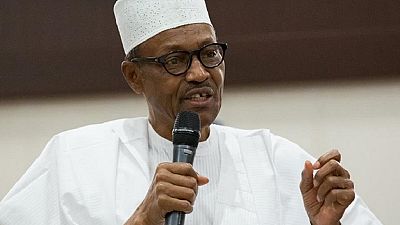

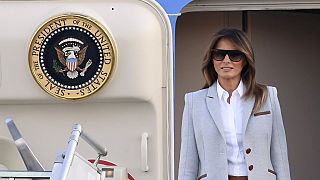
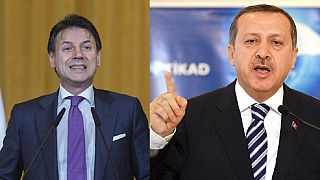

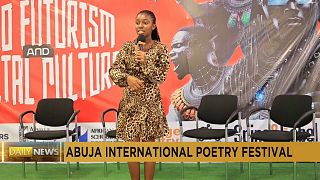
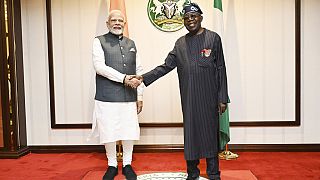
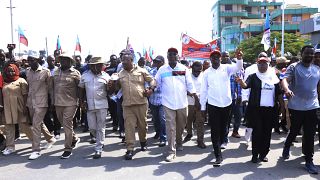
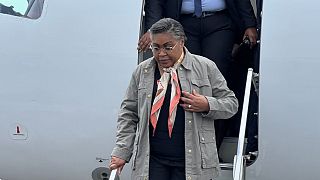
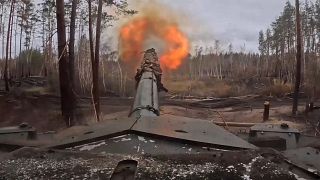
01:08
Mozambique: Opposition leader Venancio Mondlane faces legal action
Go to video
Ugandan TikToker jailed for insulting President Museveni
Go to video
Ghana overtakes Nigeria in U.S. visa overstay rates, new report reveals
01:00
Chidimma Adetshina crowned Miss Universe Africa and Oceania
00:58
Voting underway in Somalia's breakaway region of Somaliland
01:07
Opposition leader leads polls in Ghana's presidential race